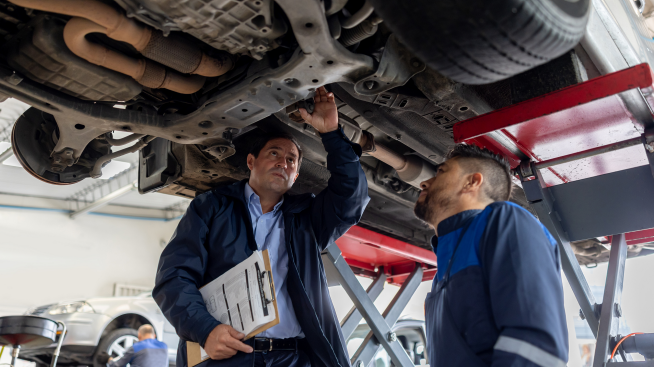Car air filters 101: A user's guide

Your car’s engine requires a steady supply of clean air for combustion. Dirty air can hinder the combustion process, reducing your engine’s life over time. A car air filter helps protect your engine from potentially harmful debris and contaminants.
What does an air filter do in a car?
A car’s air filter acts as a barrier between the engine’s air intake and the engine itself. Engines can suck up a massive amount of air per second … filled with dust, debris, moisture and plenty of bugs. All of that would be heading straight to your engine without the air filter, where it could cause damage to crucial engine components. The engine filter ensures that the engine has a steady supply of fresh, clean air to use in the fuel-air mixture that powers combustion.
Car air filter types
Car air filters come in three main types: paper, cotton-gauze and foam. Each one has unique characteristics, benefits and drawbacks.
Paper
Paper air filters use a paper element that’s typically pleated in an over-under pattern, yielding a very large amount of surface area for filtration in a relatively tight frame. Paper filters aren’t reusable and require more frequent replacement. Luckily, their simple-yet-effective construction and affordable materials mean paper car air filters are generally inexpensive and easily replaceable.
Cotton-gauze
Cotton-gauze filters are longer-lasting than paper filters, with the added bonus of being washable and reusable (up to a point). There are two sub-varieties of gauze filters, oiled and synthetic dry. If cleaned and maintained at regular intervals, these engine filters can potentially last for a hundred thousand miles or more.
Foam
Foam filters are typically reserved for smaller engines like lawnmowers. Some manufacturers wrap their other car air filters with foam filters as an extra layer of protection and filtration. This may be an option to consider if you live in or visit an environment that’s especially dusty or polluted.
How often should you change a car air filter?
Car air filters are vital to your engine’s health and replacing them regularly should be part of your maintenance checklist. Paper air filters, for example, usually last for at least a few thousand miles, though this may vary depending on the air quality around you. It’s generally best to consult your owner’s manual and follow the manufacturer’s recommendations for engine air filter replacement. If you’re worried about the air quality around you potentially shortening the recommended lifespan of your filter, you can always ask your mechanic to check it out next time you’re at the shop.
Engine air filter replacement cost
While engine air filter replacement costs can certainly differ, paper filters are usually considered the least expensive. You may want to note, however, that the cost of replacement will also include your mechanic’s cost of labor, which will vary depending on the shop. It’s best not to ignore a car air filter replacement, though, as it could lead to bigger and more expensive engine repairs down the road.
In summary
Revving up your engine would be hard to do without the car air filter. By taking good care of this vital component and following the recommended maintenance schedules, you can keep your car running a little smoother and help avoid costly repairs. Your car (and your wallet) will thank you for it!



